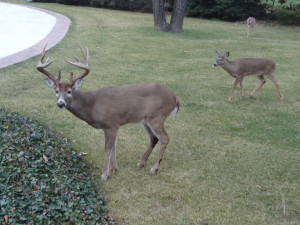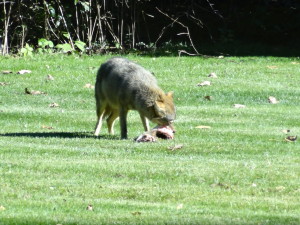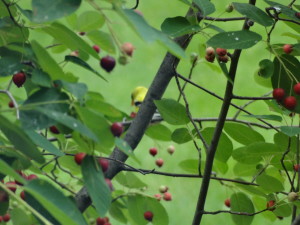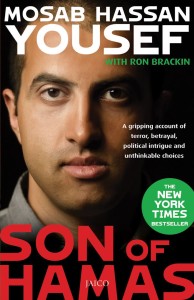
A view of nature as I wake up in the morning. In any weather, it fills me with a sense of gratitude for life.
The natural world never ceases to fascinate me. The suburb in which David and I have lived since 1984 has plenty of trees. Every morning, as I wake up, I see various birds, many of them with beautiful colors. I also see all sorts of animals of different sizes, some more frequently than others. Their primary daily activities appear to be to eat for sustenance.
I also see many squirrels with only half tails, or less, left. I have a theory, which is yet to be proven with my own eyes, that the other half of the tail was lost when a hawk tried to eat the whole squirrel without success. A hawk must have been able to hang onto only half the tail, while the squirrel did whatever was in its instinct to break free from the predator midair.
While it is a rare occurrence, I have even seen a coyote eat a good-size, fresh prey in our backyard. When the predator had enough to eat, it buried the remainder, walked over to one of the trees, sat down underneath it, which provided shade from the sun and the heat, held its head up, enjoying the breeze and looking perfectly content and relaxed.
Whether they are carnivores or plant eaters, nature provides plenty for all of these animals to eat. Seemingly, each of these living creatures is minding its own business. Yet, as a whole, they are all living their lives in perfect harmony with nature.
Fight-or-flight instincts guide the animals. When threatened, they fight to keep their territories intact. Survival of the fittest is the name of the game. Beyond their own territory, however, they do not attempt to conquer and control the entire population of its own kind. Such behavior is not in the realm of their instincts.
What appears to be uniquely human is that some develop ambition to conquer the world at the expense of others, millions of others in some cases. No other animals abuse and/or kill their own kind, en masse, as some humans do. History is full of such examples of slavery and mass murders.
This begs the question of whether or not it is human nature to conquer others through mind control, brute force, or both.
What is human nature? Merriam-Webster’s dictionary defines it as the ways of thinking, feeling, and acting that are common to most people. This definition, however, does not explain why human history is filled with violence.
Recently, I learned from Dr. Barry Schwartz something that was quite eye-opening about human nature. In his TED Talk, Dr. Schwartz pointed out, in part, that “we design human nature by designing the institutions within which people live.” Wow! His observation about human nature finally helped explain the mysteries about human behaviors. It especially helped me understand the extreme ends of the spectrum of human nature. In other words, why some people are genuinely kind, thoughtful, and loving while some others are filled with hatred, rage, and violence. Most of us fall somewhere in-between these two extremes.
His explanation also helps understand why some religious institutions, especially extremists within, to this day, perpetuate violence by inculcating their own children to hate and kill those who do not believe in their religion. In November 2015, PBS broadcast a heart-breaking example of it in a documentary called, “ISIS in Afghanistan.”
In recent history, for as long as I can remember since I came to the United States in the 1970s, almost every American President has been trying to play the role of a peace maker between Israel and the rest of the Arab world. Despite such on-going efforts, however, it seems that there is no permanent resolution to the never-ending conflict in the Middle East.
A book called, “Son of Hamas,” written by Mosab Hassan Yousef, gave me a rare glimpse into the Arab world which, until now, I hardly understood. At its core, I saw yet another example of human nature at work, designed by the leaders within the Middle East who hold the power to change the course of humanity. The question is “Will they ever?” after 1400 years of tradition. Within the book lies a possible solution to the Middle-East conflict and it seems much more promising than anything else that has been tried.
- The fact that the author, MHY, is the first-born son of one of the founding leaders of Hamas, a known terrorist group in the Middle East, is what makes this book unique.
- Like Mitsuo Fuchida (the commander of the Pearl Harbor attack), MHY converted to Christianity.
- MHY’s true friendship with Gonen ben Itzhak (aka Captain Loai), an Israeli, reminds me of the relationship, founded on mutual respect, between James Donovan (American) and Rudolf Abel (Russian), as depicted in the movie, “Bridge of Spies.”
- MHY’s book ends with a scene where, on the sidewalk in California, he “spotted… Maher Odeh, the mastermind behind so many suicide bombings…” I’d like to think that MHY’s safety is being well-protected in this country.
- If this two-minute interview of MHY does not make you want to read his book and understand what the world is facing today, I don’t know what would.
Freedom is something every human being wants. Muslim extremists believe in freedom in the afterlife. I, for one, believe in freedom while I’m alive. And I am blessed to call my home, surrounded by nature and its stunning beauty, my heaven on earth.
Merry Christmas to you and your loved ones!
p.s. A follow-up post on a comment by Mosab Yousef, May 22, 2021





